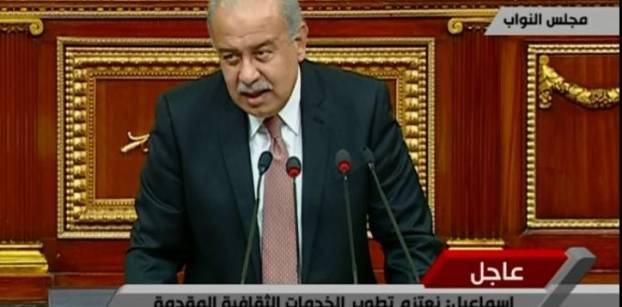PM says govt will cooperate with Church to release new church-building law

Prime Minister Sherif Ismail - photo from state TV
CAIRO, Aug. 23 (Aswat Masriya) - Prime Minister Sherif Ismail said on Tuesday that the government is keen to fully cooperate with the Coptic Orthodox Church in releasing a draft law to organise the building of churches.
Meanwhile, the parliament is waiting to review the draft law after it passes through the State Council and the cabinet as per the provisions of the Egyptian constitution.
Critics of the new bill argue that the authorisation to build churches will remain in the hands of the executive branch, represented in governors, who would have absolute authority in granting licenses for the construction and renovation of churches.
Egypt's Coptic Orthodox Church said last Thursday that its representatives attended a meeting with various state officials to discuss the law on Wednesday.
"The Church was surprised to find unacceptable alterations and impractical additions and it announced that they will pose a danger to Egyptian national unity because of the complications and obstacles that [the law] contains," the Church wrote in an official statement.
Ismail, told the state-owned MENA news agency on Tuesday, that communication and consultations to put the bill in its final form are constant.
The bill consists of various items and definitions of what constitutes churches, church extensions, religious leaders, and sects.
The Prime Minister received Pope Tawadros II on Monday to discuss the project of the church- building law.
Since 2011, the transitional ruling authority represented in the Supreme Council of the Armed Forces (SCAF) had promised to pass a law regarding the building of churches.
Coptic Christians have long demanded fairer regulations in relation to the construction and expansion of churches, which are subject to tight restrictions.
In July, rising sectarian violence in the Southern province of Minya sparked criticism regarding the state's approach towards such violations.
The local NGO Egyptian Initiative for Personal Rights has recorded at least 77 cases of sectarian violence in Minya from the 2011 Uprising until Jan. 2016, including attacks on churches, and other religious buildings and schools.
Following the ouster of President Mohamed Mursi, attacks on christian houses of worship increased amid political turmoil at the time.
According to the U.S. State Department's 2015 International Religious Freedoms report, the Egyptian military completed the rebuilding of 26 of the 78 churches and other Christian properties burned by "Islamist-led mobs" in the aftermath of Mursi's ouster.
Coptic Orthodox Christians make up about 10 per cent of Egypt's population and are the Middle East's largest Christian community.









facebook comments